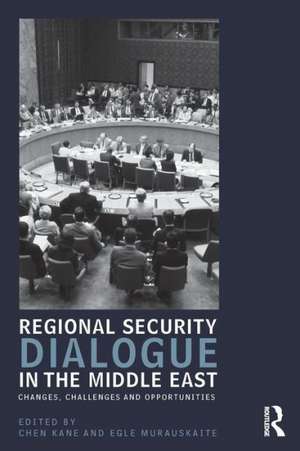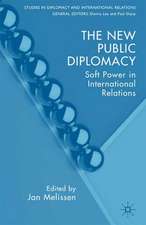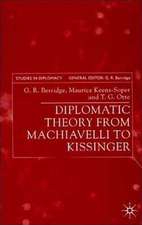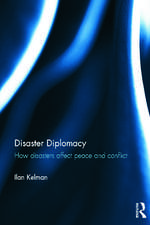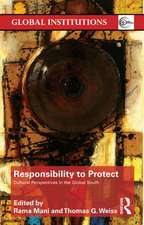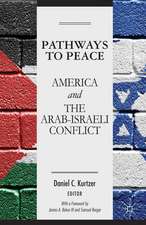Regional Security Dialogue in the Middle East: Changes, Challenges and Opportunities: UCLA Center for Middle East Development (CMED)
Editat de Chen Kane, Egle Murauskaiteen Limba Engleză Paperback – 26 iun 2014
The Helsinki Process began in a divided Europe in the early 1970s and, over 40 years, achieved major successes in promoting cooperation between the Warsaw Pact and NATO member states on social, human rights, security, and political issues. In this volume, established Middle East experts, former diplomats, and emerging scholars assess the regional realities from a broad range of perspectives and, with the current momentum for reform across the Middle East, chart a path towards a comprehensive mechanism that could promote long-term regional security.
Providing a gamut of views on regional threat perception and suggesting ways forward for regional peace, this book is essential reading for students and scholars with an interest in Politics, the Middle East and Conflict Studies.
| Toate formatele și edițiile | Preț | Express |
|---|---|---|
| Paperback (1) | 489.26 lei 43-57 zile | |
| Taylor & Francis – 26 iun 2014 | 489.26 lei 43-57 zile | |
| Hardback (1) | 1165.20 lei 43-57 zile | |
| Taylor & Francis – 27 iun 2014 | 1165.20 lei 43-57 zile |
Din seria UCLA Center for Middle East Development (CMED)
-
 Preț: 392.87 lei
Preț: 392.87 lei -
 Preț: 305.85 lei
Preț: 305.85 lei -
 Preț: 431.35 lei
Preț: 431.35 lei -
 Preț: 488.71 lei
Preț: 488.71 lei -
 Preț: 416.26 lei
Preț: 416.26 lei - 15%
 Preț: 426.20 lei
Preț: 426.20 lei - 15%
 Preț: 698.17 lei
Preț: 698.17 lei -
 Preț: 443.78 lei
Preț: 443.78 lei -
 Preț: 413.33 lei
Preț: 413.33 lei -
 Preț: 413.94 lei
Preț: 413.94 lei - 26%
 Preț: 819.90 lei
Preț: 819.90 lei -
 Preț: 418.13 lei
Preț: 418.13 lei - 13%
 Preț: 337.39 lei
Preț: 337.39 lei -
 Preț: 415.24 lei
Preț: 415.24 lei -
 Preț: 369.43 lei
Preț: 369.43 lei -
 Preț: 360.43 lei
Preț: 360.43 lei -
 Preț: 363.53 lei
Preț: 363.53 lei -
 Preț: 366.68 lei
Preț: 366.68 lei -
 Preț: 366.47 lei
Preț: 366.47 lei -
 Preț: 387.42 lei
Preț: 387.42 lei -
 Preț: 385.08 lei
Preț: 385.08 lei
Preț: 489.26 lei
Nou
Puncte Express: 734
Preț estimativ în valută:
93.65€ • 101.76$ • 78.72£
93.65€ • 101.76$ • 78.72£
Carte tipărită la comandă
Livrare economică 21 aprilie-05 mai
Preluare comenzi: 021 569.72.76
Specificații
ISBN-13: 9781138018495
ISBN-10: 113801849X
Pagini: 272
Ilustrații: black & white illustrations
Dimensiuni: 156 x 234 x 13 mm
Greutate: 0.45 kg
Ediția:1
Editura: Taylor & Francis
Colecția Routledge
Seria UCLA Center for Middle East Development (CMED)
Locul publicării:Oxford, United Kingdom
ISBN-10: 113801849X
Pagini: 272
Ilustrații: black & white illustrations
Dimensiuni: 156 x 234 x 13 mm
Greutate: 0.45 kg
Ediția:1
Editura: Taylor & Francis
Colecția Routledge
Seria UCLA Center for Middle East Development (CMED)
Locul publicării:Oxford, United Kingdom
Public țintă
Postgraduate and UndergraduateCuprins
Introduction – Chen Kane & Egle Murauskaite Part I: The Helsinki Process 1 Cautious Optimism – Lynn M. Hansen 2 A Zone in the Middle East – Rolf Ekeus Part II: Perspectives from the Region and Outside 3 The Helsinki Process and the Middle East – Nabil Fahmy & Karim Haggag 4 The Helsinki Process and its Relevance in a Changing Middle East - Ehud Eiran 5 Nuclear-Weapon- Free Zone in the Middle East: a Political View – Turki Al Faisal & Awadh Al-Bad 6 Domestic Politics in Iran and a Future Regional Process – Ariane M. Tabatabai 7 Lessons learned – Nilsu Goren Part III: The Middle East Today 8 The Helsinki process in the Middle East -Gershon Baskin & Hanna Siniora 9 The Future of Arms Control in the Middle East - Bilal Saab 10 The Middle East and the Helsinki Process – Mike Yaffe 11 Civil Society Dialogues and Middle East Regional Security – Peter Jones Part IV: Possible Futures 12 A Helsinki Process for the Middle East – Patricia Lewis & Karim Kamel Conclusion – Chen Kane
Notă biografică
Dr. Chen Kane is Middle East projects manager at the Center for Nonproliferation Studies. Dr. Kane is the author of numerous publications and the founder of the Middle East Next Generation Network. Dr. Kane held research positions at the Center for Strategic and International Studies, Belfer Center for Science and International Affairs, Harvard University, and the Washington Institute for Near East Policy.
Egle Murauskaite is Research Associate at the Center for Nonproliferation Studies. She specializes in trends of sensitive technology transfers and interdisciplinary research on other nuclear proliferation challenges, with the focus on the Middle East and South Asia.
Egle Murauskaite is Research Associate at the Center for Nonproliferation Studies. She specializes in trends of sensitive technology transfers and interdisciplinary research on other nuclear proliferation challenges, with the focus on the Middle East and South Asia.
Recenzii
This collection offers a number of intriguing options for establishing a regional process for arms control and regional security dialogue in the Middle East. To assess the options for moving forward on a security process in the region, the authors of the book’s essays draw on the Helsinki Process, which began in 1972 as a forum for NATO and Warsaw Pact countries to discuss several groups of issues in Europe, including security.
-KELSEY DAVENPORT, Arms Control Today
-KELSEY DAVENPORT, Arms Control Today
Descriere
The book examines today’s Middle East security challenges and opportunities in light of the upheavals throughout the region. Established experts, former diplomats, and emerging scholars offer a broad range of fresh perspectives on promoting a sustainable regional security community based on relevant aspects of the historic Helsinki Process in Europe.
